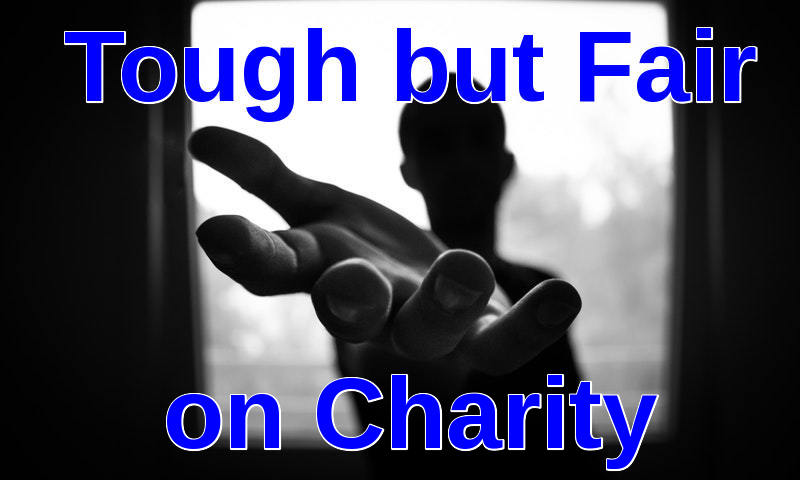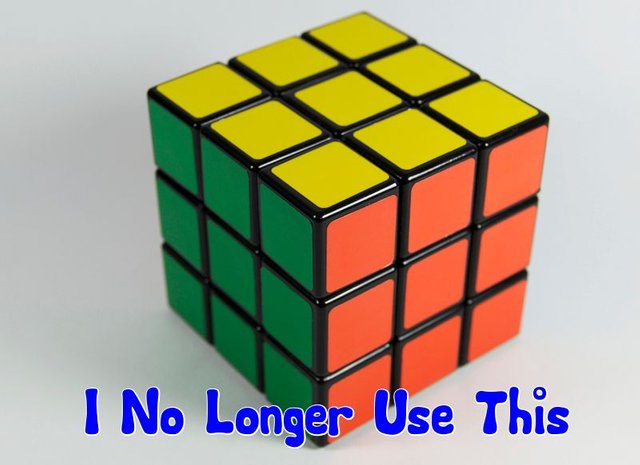Tough but Fair on Charity
Far too many people do not follow any due diligences when confronted by charities asking for assistance. From help with hurricanes to funding local food banks and so on.

Many opportunists come out of the woodwork to pray and take advantage of our human nature for compassion and wanting to help out. Sometimes benefiting the charity itself more than the supposed people they claim to be helping.
Charity can be a rather complex and confusing topic for the western world to deal with. On one hand, we have the opportunity to assist and have the resources to making the world a better place; on the other, people take advantage of that.
I don’t believe everyone can be helped in the world because let’s face it. Many of us would love a helping hand from time to time. I do believe that giving back from time to time is just an important part of being human.

Basic Table of Context
1. Not all Charities Are Created Equal
2. Resources I Use
3. High-Pressure Sales Tactics
- Their Mothers Should be Ashamed!
- Telemarketing and Advertisement
4. Asking Questions
- Basic Starter Questions
- Medium Questions
5. Thinking Local
- Possible Local Issues
- Peeing in the Pool Syndrome
6. Money Donations
- How Much to Give
- Should You Give
- Tax Break
7. Item Donations
- Avoided Consumerism Trap
- Toys and Clothing Drives
- Food Drives
- Blood Drives
- Other items
8. Volunteering Your Time
- Non-skilled Labor
- Skilled Labor
9. Steemit
10. Tough but Fair on Charity
11. Information
12. Citation

1. Not all Charities Are Created Equal

There are many charities out there that are more into giving to themselves then the people they claim to be helping. Once we dig into some of them those numbers are even worse. Now if a charity called you up and said
“Hey, we spent in 2015 91.6% of all funds we raise to do more fundraising (1).” Would this be a charity you would want to send money to? Yet enough people did that they raised over 1.5 million which means they spent over 1.3 million on raising funds(1). Imagen for a moment what you could have done with that kind of money.
If that does not sound pleasing how about another. This one is only spending a modest 87.8% towards funding and for all that effort of bringing in $6.3 million the president of the charity pocket a nice $96,500 for a job well done (2)!
Forget writing this blog I’m going to start a charity and be rich (sarcasm)! Here is a list of 10 poorly ranked charity and you see there is a common theme among them in how they name themselves. There are a hundreds to thousands more out there I would never send a dime to.

2. Resources I Use

You always need to do your research even if it takes time. As an American one of the many places I first stop to look for quick and easy information is charitynavigator. This allows you to search quite an array of charities and even find better ones.
That site goes into great detail about their methodology used in collecting information and ranking charity.
From there you should also check out the charity’s website, twitter, Facebook and so on.
Run some internet searching seeing if people have had issues in the past. How well they deal with things. While searching for “scam” or “fraud” can be helpful they can also cause false flags.
Heck even check them out on Better Business Bureau if you can.
Depending on how much assistance you are giving you might also consider checking them out in person if possible.

3. High-Pressure Sales Tactics

Speaking from my own personal experience that some “charities” have in the past are disgusting to deal with. They like to target people with high-pressure sales tactics.
Their Mothers Should be Ashamed!
The kinds of things people say just makes you wonder how much they are getting paid
- It is a shame if your house burned down tonight and you died in it because you didn’t donate $1000
- You know how many people are going die tonight because of your selfishness
- I hope you never need police assistance since you’re not paying for it
- We only accept payments of $50 or more
- You need to donate now with a credit card I am being told to hang up the phone soon
- You can’t call back tomorrow it has to be today
- Sorry, can’t give out that information you need to donate now anyways
- Only a criminal would ask that question
- How dare you make such slanders accusations we are an honest charity
- Endless harassing emails, phone calls, and mailers to your house
- Time is so important if you don’t help right this moment you can’t later
Telemarketing and Advertisement
Yep, I’m not the guy to call up and start asking for money if your intention is to use kids and disabled people as your pawn to exact money from. Many charities pay a lot of professionals to do their dirty work for them. If those people make a commission like sales representatives then you can only imagine how far they would be willing to go to use a disabled child charity as a way to get money out of you.
If you receive a call, see an advertisement, or get a knock on your door. Do your research first before donating. Don’t feel you need to donate right away. Don’t feel you need to donate an insane amount because they “recommend” you give them $1,000 or 20% of your total yearly income.
In fact, most resources out there have the mindset that you should hang up the phone and find your own charity to donate to instead (3). I happen to agree for the most part.
Keep an eye on elderly or those who are disabled. Some “charities” just love to contact people who are at a disadvantage and take advantage of the situation. I’ve seen it happen before and I’m sure it’s going on right now.
Take your time, ask questions, and make sure your money is going to a place you feel would treat it with the respect it deserves. After all, you work hard for it.

4. Asking Questions

There are an endless amount of things you could ask, should ask, and I can’t cover all of them. Here are some basic ones I would consider. If they were not already given to you in one context or another-- ask. Do your own independent research to verify and then decide what is best for you.
Basic Starter Questions
- What is your main mission statement?
Honestly, if you can’t understand what they are even doing walk away from the situation. That charity is just not for you. Sometimes people like to talk above and over complicate as a way to mask how bad of a charity it really is.
- How long has the charity been in operation?
If you're telling me you are raising funds to ship water filters off to Africa and your charity is two months old well I got some bad news. Logistics of that is complicated and a nightmare. Covered with red government tape: endless paper work, customs, and possible thief by the local government to name a few. I won’t say they can’t do it; but, they would require someone with experience otherwise they are biting off more than they can chew.
Quite a few of the troublesome charities seem to just pop up overnight. They even have the brains to name themselves after a name of a storm, or a country they are going help. While not all of these will fail in their mission goal and waste donations – few red flags should be raised. Stop paying people for charity convenience.
- How does my donation(s) directly help out?
Is this a charity that is raising funds and directly giving it to those in need? Or is this one of those we are collecting for another charity who is collecting for another.
How much is expected to make it to the party they are helping? If they are spending it all on advertisement and administration cost walk away fast-- very fast.
Details in this question matter. If they can’t tell you then why are they even asking for money? The fewer hands a donation needs to go from to the actual party it is supposed to be helping the better it is for your donation and the person receiving help.
- What can I do to help?
Are they only looking for donations in money? Would an item donation work? Are they in need of volunteers?
Medium Questions
- Who qualifies to receive assistance from your charity?
If just anyone can walk in the door and declare they need $2,000 for their rent and they are given it right away. While being allowed back month after month and year after year. This is called creating a dependence on charity. People on both ends take advantage of it and your donation.
If you want your donation to truly help those in need; then, there needs to be a defined outline of who gets help. Low income? Who is considered low income? Someone who lost a home to a hurricane? Ok how do you verify they lost their home/were affected by the storm?
- How much do you need?
Well, that’s a loaded gun of a question. No charity wants to tell you they only needed $200k and they have already raised $250k. It should be important to you because that is going to affect where your donation is going if anywhere. If they are already overfunded then its best to move on. A project that gets overfunded end up being less efficient with their spending. They also became accustomed to having that amount every year and naturally want more the next year.
I’m sure you can think of some funny startups that received insane amounts of over funding and then blew it all and still failed to produce a project. Same thing happens in charities. Sometimes less is more because it requires more careful and thoughtful planning and budgeting.
- Can I stop by/Visit?
If the charity is local and you are considering a large donation it never hurts to ask. You may want to see firsthand how your money is going be spent. Depending on the amount and how long term are considering being a monthly or yearly donor. Even if the answer is –no. Nothing wrong with just driving by the public address in making sure it’s what it claims to be from the outside.
If you do get invited in this gives you the opportunity to make sure everything looks and sounds correct. It’s just one of many due diligence you need to do with a large donation. It also shows you care and want to be a long term supporter of the said charity. Don’t expect a $5 donation to get you inside to look around. The ten cent tourer is usually reserved for top donors.
- Will you contact me in the future/what happens to my information?
If you think giving someone money will make them go away and never bother you again then be shocked! Charities often solicitant those who have given in the past and the higher you are up on the donation list the more often they will contact you.
While certain places it might be illegal for someone to say selling your information including you just gave $20k to their cause and what tactics worked on you. That kind of information if it pans out pays a lot of money. Make sure it’s clear what happens to your information.
Now those are just some off the top of my head on what I have asked in the past. A lot of it is just situational. The more you give in money, items, and time the more questions should be asked.

5. Thinking Local

When it comes to charity I often think local. Everyone always gets caught up on supporting overseas ones. Yes, there are many people in need around the world. However, you can’t forget about home first.
Possible Local Issues
No one likes to think there are local homeless children, those starving in the streets, and entire towns with no jobs that are slowly wasting away or have been devastated by weather. Who are now unable to rebuild. While wealthier nations do have more safety nets in place to help those out people often fall between the cracks as well.
The nice thing about thinking local is you sometimes get to see the direct results with your own eyes. It also means smaller charity with fewer administrations costs and overhead can operate. There simply is no need to create and maintain open channels for overseas logistics. Sometimes having to “pay off” the right locals authorizes to make sure goods arrive “safe” among other things.
If there is not a small and lean running charity then I may turn to a larger one and support a local branch of its operations.
Peeing in the Pool Syndrome
The issue with supporting local branches of large charity is it suffers from what people call “peeing in the pool syndrome” What that means is if you pee in the pool can you stop it from spreading to other parts of the pool aka the budget?
If you donated X amount to a local chapter; then, a normal quarterly amount from the larger part of the organization might be reduced or sent elsewhere. Simply because someone running the books looks at things and goes “hey they are over funded by X so we will send Y to another branch instead. Since they are doing fine compared to other more needy areas.”

6. Money Donations

There are three main ways to donate to a charity: money, items, and time. This section will focus on money. Cash is considered the winner most of the timeout of the three because it can pay for the other two.
How Much to Give
If you ever took a personal finance class or gone to church you might be told you need to be donating around 10%-20% of your income. Many charities love to say the same thing.
Do yourself a favor and toss that mindset right out of the window. It’s one of the stupidest things I have ever heard in my life. Everyone’s financial situation is different and you just can’t put a % on how much someone has to give if anything at all. It’s their money.
Should You Give
There are a few situations where I feel it’s best to not donate your money. If you feel a need to still help out there are always things like items and volunteering your time:
- You are living paycheck to paycheck
- Having to make a great sacrifice to make the donation (i.e. basic needs: food, medical, shelter, and clothing)
- You are on government assisted living due to low income and are not retired
- Deep in debt or are taking out debt to donate
- You do not have an emergency fund yourself and would, therefore, be depending on same charity you are giving to
My main point here is if you’re not in a financial situation to be directly giving money then don’t. There are other ways to help and be charitable if you choose to be. The last thing you want to be is a burden a few months later on the charity you just gave money too.
Tax Break
Some exceptions to this rule are taking advantage of any and all tax breaks your governed allows you to take for donations. I am a strong believer that governments should allow its citizens greater control over its own money giving them tax breaks to make contributions.
IRS for instance in America as of writing this allows up to “50% percent of adjusted income” with some restrictions in place to be deducted (4). Only certain types of donations and charities quality. There are limits and a fair amount of rules that everyone has to follow. Keep in mind this is just a tax deduction. Changes to the tax law happened all the time so do your own research first as things could have changed.
Sometimes you may need to show proof. So giving actual cash is not the best idea. Most resort to check or credit card. Something that leaves a money trail.
The IRS has tried to make it easy on checking if an organization qualifies by creating an online search tool called Exempt Organizations Select Check Tool. That link takes you to IRS page that goes over some things that include a link to the tool.
If you are living below your means and can financial weather a bad situation while still donating money then go for it. How much is up to you.

7. Item Donations

Items are often easy for people to donate as they already have something and most of the time they are not using it before donating it anyway. Keep in mind that there is a cost for the charity when dealing with item donations.
Avoided Consumerism Trap
It’s easy to get into the mind set “oh if I donate this I’ll have to go buy more.” Often cheaper for the charity to go out and buy at a whole sale price or discount then you buying something new just because you have to now.
If you are still using something and would not normally go out and buy something new due to its current condition then keep it and continue using. If you are endlessly giving everything away just so you can have new things that you put on a credit card then you are just digging yourself into a hole.
Western society is very much based on “having the newest and greatest” at an affordable loan interest rate of course. If you are already living paycheck to paycheck it makes zero sense to go out and buy a new pair of shoes if your current pair is just fine for what you need them to be.
Toys and Clothing Drives
Before contributing to one of these be sure to check out any website or information handouts on what is considered acceptable and what is not. Often time’s places only accept non-open toys and clothing in near perfect conditions.
If there is no information given or lack of documentation then you can expect some general rules:
- Items should be in working as intended and in one piece
- Items should not be a major health hazard (i.e. lead paint, cheap exploding batteries, recalled item)
- Clothing should not be coved in holes, torn, and extremely worn out (exemptions could be interview clothing/suits that they might pay to have repaired but always talk with charity beforehand)
- Avoid extremely expensive items unless it’s asking for (If something is rare or cost a lot is often best to sell it if you can and then donate the money. This just keeps people from being scumbags and stealing it, or the charity from having to find a buyer)
- If an item has stains, an order, or is deformed just toss it out.
- Some things are considered only donate if new and unopened -- underwear.
- Always best to use common sense and ask why you do not want an item anymore. If it’s in a garage condition then toss it or repurpose for personal use.
Food Drives
As someone who uses to do food drives when I was younger, I find this video by Adam Ruins Everything both kind of funny but very true. Things that people would donate that they should have tossed instead:
- Expired food
- Food with no labels
- Large amounts of the same thing that they didn’t eat and no one want either
- Dog/cat food for a human food drive
- Open containers
- Food that was damp/rusting/leaking
The accountant in me can see all the costs in dealing with bulk and heavy items some of which are talking about in the short video (5).
- Sorting and inventorying
- Disposal and dealing with products that leaked/ gone bad after the fact
- vehicle and building costs
- Redistribution and transportation
- Bunch of other costs
This is one example where it’s just best to give money; instead of, going out shopping unless you’re an extreme couponer and get things all for free that a food bank needs (just ask them what they need). Money just allows them to buy all the short term perishables they need and fill in their stock of the longer shelf stable items.
If you happen to be overstocked and things meet requirements and are in good condition then go for it.
Blood Drives
This is one of those things where you have to answer questions honestly. Not everyone is qualified to donate blood. If you get turned down to donate this is NOT a time to go to another blood bank and lie just so you can give.
Often times if you do not know your own blood type you can give blood and they will let you know for free. Why waste $50-$200 at the doctors when you can find out “free.”
Giving blood is often about timing. Everyone during major disasters and holidays goes out in droves and donates blood. If you don’t mind when you donate blood consider the following:
- Low times of the year like summer
- Just your normal everyday middle of the week day
- When the local blood bank puts out an ad asking
- If a number is provided call up and ask what times of the year they are low
Other items
There are a lot of other items not coved here like cars, boats, homes, cell phones, and other electronic devices. While many organizations will repair quite a few of these items or accept them even if they are old and not the best looking (i.e. rust/paint damage, broken down house for fire fighters to burn down a in a real world practice).
When donating items make sure you check out if it's tax deductible and take full advantage of any tax breaks you can get. IRS for instance in America as of writing this allows up to “50% percent of adjusted income” with some restrictions in place to be deducted (4).

8. Volunteering Your Time

When volunteering time there is often two types: non-skilled Labor and skilled labor. If you’re looking to donate your time look at your current skill set and see what you can donate your time towards and help out. You also want make sure you are following given directions.
Avoid being a burden on the system in the time of need. If you’re told to not go into the middle of the hurricane to “start rebuilding” then wait. Last thing you want to do is cause emergency services to be used on you instead of someone that lives in that area. In other cases, everyone time being wasted or not properly used.
Non-skilled Labor
Is often doing reparative tasks that require little or no training. Some examples:
- Using a hammer
- Asking people to fill out a form
- Answering a phone
- Moving debris with your hands after a storm
Skilled Labor
Often something that requires prolonged training that might have required a college degree or certification.
- Automotive repair
- Preparing taxes for low-income family’s
- Truck driving that requires a commercial driver’s license
- Forklift operation or other heavy equipment
If you have the required legal certifications and/or college degree and want to get some real world experience. This is a great option if you are having a hard time finding work and want to build some experience. Keep in mind many places might consider it not worth their time or already have enough overly qualified individuals assisting them.

9. Steemit

What about helping others on Steemit? From charities to people asking for donations a lot of the above can be used.
As I have stated before I don’t believe we can help everyone on the planet however it’s our human nature to help others. I would much rather reward blogs that are sharing knowledge or experience than someone taking advantage of other people’s kindness. People like that can be found on every part of the internet and on a lot of streets around the world.
With that in mind, there are a few things that I consider every time I do upvote a charity like a drive blog.
Read the entire thing. Sometimes even multiple times. If you are not taking the time to understand what your upvoting then why are you upvoting?
Who is bringing attention to the cause? Is it someone who is a high ranking witness, a long time respect member of the community, or someone new that has never posted before?
Verifying facts and asking questions. The more your upvote is worth the more time on due diligences you need to invest into making sure it’s a legit cause. Because people would never EVER lie on the internet about such things. My upvote is just worth 3 cents so I don’t spend a lot of time. Naturally, someone’s who vote is worth ten(s) to hundred(s) really needs to spend a moment and check things out for themselves.
How much is needed? If people are not willing to be open about how much is needed then how the community is supposed to know when it’s enough?
What is the raised funds going be used for? If you’re begging for money to put in a swimming pool in your own back yard, or a trip to go out drinking in Vegas and gamble count me out.
How are the raised funds being handled? Is the blog going 100% to the person or just the liquid part? Are they asking for direct donations to a wallet? Is someone matching donations to a wallet?
Verifying the person is not being overfunded. You might see something like $200 is needed for X. You go check out their wallet and they been sent $500 total. When I read comments like “I can’t afford to donate $50 but I did anyways because you are in more need” Well wait a moment they only needed $200. They had $500 before you gave your $50 now they have $550. You really must not need that since you could not be bothered to check first.
Thinking local. There are so many people in need I only focus on those I’m following and whatever those people consider resteem worthy when it comes to charity. If it’s just some complete stranger on the internet there are a million and one other places to get help.
I often prefer to upvote that person’s open blogs to comments. I then leave a comment on the blog that’s asking for help that I have done just that. It’s ensuring it will go directly to the person and I’m rewarding that person for things they have done.

10. Tough but Fair on Charity
When it comes down to it I understand that people sometimes just need a little helping hand to get back on their feet. I am however not a sucker. I know full well there are people who take advantage of any situation to try and profit from.
I often do a fair bit of research as you have just read before I am willing to help out a cause. I would much rather a lean and smooth operating charity receive my help than a circle jerk of board directors stuffing their fat wallets or letting the place be robbed because they don’t have the backbone to say no.
Charity can also cause more harm than good. I’m sure you have heard of Welfare dependency the same thing happens in charity.
Charity is a thing that needs to be respected; otherwise, people just take advantage for personal gain. This is why you need to be tough but fair on charity.
Thanks for reading.


11. Information
Unless otherwise sited everything written is my own expressed opinion. I have written this from my own personal viewpoints, and dealing with charity in the past. Everything from food and toy drives when I was a kid to donating time and money as an adult.
Unless otherwise sited information should be consider written form personal experience to common knowledge in the charity industry.
Disclaimer: I am not a certified financial adviser or a tax professional. You should do your own independent research or hire a professional if you feel it is warranted.

12. Citation
- https://www.charitynavigator.org/index.cfm?bay=search.summary&orgid=12035
- https://www.charitynavigator.org/index.cfm?bay=search.summary&orgid=3698
- http://www.kiplinger.com/article/spending/T048-C011-S000-how-to-check-out-a-charity-before-you-donate.html
- https://www.irs.gov/charities-non-profits/charitable-organizations/charitable-contribution-deductions
- Adam Ruins Everything --Youtube

Just checking on you... I hope you are doing ok there and got through the storm safely!
I'm safe, power grid, cell towers, everything a mess. couple days without power. its going back down soon since they need to repair more stuff.
I miss you too, are you okay?
Miss you, are you okay?!
I'm good. had no ac for a few days. Just got power and internet back for the moment. its going go back down.
power grid/internet/cell network here is a mess.
some damage. lots of down trees.
I hope you are ok :)
I will deal with this more tonight, as you know I have to leave soon.
You know my stance on a few things.
I hope you are taking good care of yourself down there man!!
I’m more or less set now. Just got wait and watch. React and cover!
Don’t want waste a bunch of money and time having to evacuate if don’t have to. Don’t want to be in the way if I need to… I should get a kite and fly it!
I never thot of flying a kite. Are you leaving now that the wind turned West?
So far we are going stay. How about you you?
Came back as promised......... I still feel the same buddy.
Take care and keep your good work up my brother.
You are so on point with this, being a Floridian myself I see so many rip of charities around and now with this Hurricane Irma here we will unfortunately see a rise in scam charities over the next few months.
Congratulations @enjar! You have completed some achievement on Steemit and have been rewarded with new badge(s) :
Click on any badge to view your own Board of Honor on SteemitBoard.
For more information about SteemitBoard, click here
If you no longer want to receive notifications, reply to this comment with the word
STOP